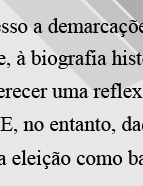

................................
These considerations, broadening the range of the biographical works considered herein, obviously bear weight in their final reckoning and in the conclusions deriving thereof. However, this weight, although significant in quantitative terms, is more indicative of the variety of the genre. With various extents and scopes – not including literary memoir and fictional writings due to their specific nature, from extensive portraits to compilations, such as dictionaries and catalogues, purely academic biographical notes, intellectual biographies, and even the panegyric literature of praises, they are sufficiently expressive in number to at least confirm historical biography in Portugal as a common resource for historians and curious minds.
As a difficult object to frame, with vastly blurred lines, and due to the proverbial aversion of the Portuguese historiographical environment to self-reflective exercises, historical biography rarely received the attention its practical relevance would justify. These contributions, although sporadic, are nonetheless significant, especially regarding the change in status that the genre underwent during the nineteenth century. This change is immediately evident in the debate – albeit localised – sparked by biographical writing at the end of the century, largely due to the work of Oliveira Martins and those who adopted and discussed positivist theories. These years witnessed a significant portion of the very scarce theoretical reflection on biographical writing in the country, an exercise that was always more practical than reflective. But the awareness of the singularity of the genre and its implications had been set in motion.
It is true that the initial appraisals of the volume of biographical production tended to be negative, reflecting more concerns and anxieties in particular fields than a more in-depth observation. For example, Pinheiro Chagas regretted above all the lack of "universal biographies" that would preserve and honour the memory of the "illustrious men" of the nation, as he would later complain of the scarcity of literary memoirs that served as the basis for the historian's work – but not without noting that never before had so many biographical notes and news been published, which he referred to as a "delirium of minutiae." Here, Chagas, as a practitioner of the genre, compared the work of a conscientious and critical nature, more typical of the academic circuit in which he also circulated, to texts designed specifically to satisfy the more prosaic appetites of the 'general' public. Nevertheless, the increasing activity of his contemporaries in the art of biography was attested to – and did not wane in the times that followed.
